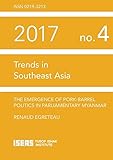The Emergence of Pork-Barrel Politics in Parliamentary Myanmar / Renaud Egreteau.
Material type: TextPublisher: Singapore : ISEAS Publishing, [2017]Copyright date: ©2017Description: 1 online resource (23 p.)Content type:
TextPublisher: Singapore : ISEAS Publishing, [2017]Copyright date: ©2017Description: 1 online resource (23 p.)Content type: - 9789814786270
- 9789814786287
- online - DeGruyter
- Issued also in print.
| Item type | Current library | Call number | URL | Status | Notes | Barcode | |
|---|---|---|---|---|---|---|---|
 eBook
eBook
|
Biblioteca "Angelicum" Pont. Univ. S.Tommaso d'Aquino Nuvola online | online - DeGruyter (Browse shelf(Opens below)) | Online access | Not for loan (Accesso limitato) | Accesso per gli utenti autorizzati / Access for authorized users | (dgr)9789814786287 |
Frontmatter -- FOREWORD -- EXECUTIVE SUMMARY -- INTRODUCTION -- WHAT IS PORK-BARREL POLITICS? -- INTRODUCING CDFs IN POST-JUNTA MYANMAR -- THE DISTRIBUTION OF BENEFITS TO CONSTITUENTS: SOME EMPIRICAL EVIDENCE SINCE 2014 -- CDFs AND CORRUPTION -- CDFs AND THE CLIENTELIZATION OF POLITICS -- CONCLUSION: WHERE DO WE GO FROM HERE? -- REFERENCES
restricted access online access with authorization star
http://purl.org/coar/access_right/c_16ec
In 2014 Myanmar introduced a constituency development fund (CDF) to sponsor small public works and development projects in each of the country's 330 electoral constituencies. As a form of "pork-barrel" spending, CDF programmes have long remained controversial among international donors, anti-corruption agencies and civil society watchdogs for their potential for corruption, embezzlement, waste of public money, vote-buying and other clientelistic behaviours. The CDF has however emerged in as an extremely popular instrument for lawmakers, in offering new opportunities for meeting the basic infrastructure and development needs of local communities. The scheme has also fostered more frequent interactions among parliamentarians, local bureaucrats, and citizens. Mechanisms for vetting and monitoring the CDF projects seem also to have grown stronger each year. Rumours about petty corruption and misappropriation cases have gradually surfaced, particularly since the National League for Democracy (NLD) took control of the legislature in 2016. Yet in the first three fiscal years of its implementation, the scheme did not lead to any known major punitive action. There is also not yet enough of a record to identify credible linkages between the use of CDFs and the building of an electoral clientele by politicians - another common criticism of "pork-barrel" funding.
Issued also in print.
Mode of access: Internet via World Wide Web.
In English.
Description based on online resource; title from PDF title page (publisher's Web site, viewed 24. Aug 2021)


